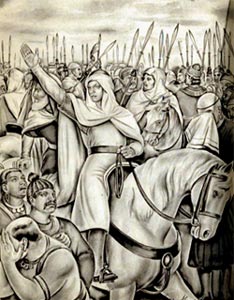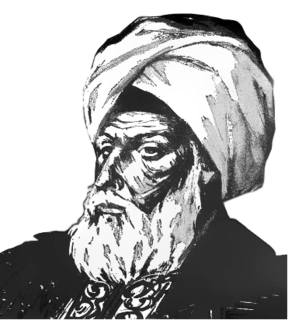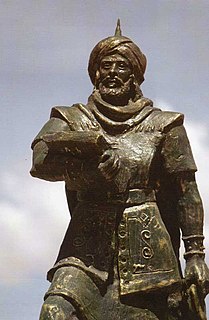 W
WAbd al-Rahman ibn Abd Allah al-Ghafiqi, also known as Abd er Rahman, Abdderrahman, Abderame, and Abd el-Rahman, was an Arab Umayyad commander of Andalusian Muslims. He unsuccessfully led into battle against the forces of Charles Martel in the Battle of Tours on October 10, 732 AD.
 W
WAbū Muhammad al-Ḥajjāj ibn Yūsuf ibn al-Ḥakam ibn ʿAqīl al-Thaqafī, known simply as al-Hajjaj ibn Yusuf, was perhaps the most notable governor who served the Umayyad Caliphate. He began his service with the Umayyads under Caliph Abd al-Malik, who successively promoted him as the head of the caliph's shurta, the governor of the Hejaz in 692–694, and the practical viceroy of a unified Iraqi province and the eastern parts of the Caliphate in 694. Al-Hajjaj retained the last post under Abd al-Malik's son and successor al-Walid I, whose decision-making was highly influenced by al-Hajjaj, until his death in 714.
 W
WMarwan ibn Muhammad ibn Marwan ibn al-Hakam, also called Marwan II, was the fourteenth and last caliph of the Umayyad Caliphate, ruling from 744 until he was killed in 750. Much of his reign was dominated by a civil war, and he was the last Umayyad ruler to rule the united Caliphate before the Abbasid Revolution toppled the Umayyad dynasty.
 W
WAbū Saʿīd al-Muhallab ibn Abī Ṣufra al-Azdī was an Arab general from the Azd tribe who fought in the service of the Rashidun, Umayyad and Zubayrid caliphs between the mid-640s and his death. He served successive terms as the governor of Fars (685–686), Mosul, Arminiya and Adharbayjan (687–688) and Khurasan (698–702). Al-Muhallab's descendants, known as the Muhallabids, became a highly influential family, many of whose members held high office under various Umayyad and Abbasid caliphs, or became well-known scholars.
 W
WMuhammad ibn Qasim al-Thaqafi, was an Arab military commander of the Umayyad Caliphate who led the Muslim conquest of Sindh and Multan from the last Hindu king, Raja Dahir in the battle of Aror. He was the first Muslim to have successfully captured Hindu territories and initiate the early Islamic India in 712 AD.
 W
WMusa ibn Nusayr served as a Umayyad governor and an Arab general under the Umayyad caliph Al-Walid I. He ruled over the Muslim provinces of North Africa (Ifriqiya), and directed the Islamic conquest of the Visigothic Kingdom in Hispania.
 W
WAbū Ḥarb Salm ibn Ziyād ibn Abīhi was a general and statesman of the Umayyad Caliphate, who later defected to the caliphate of Abd Allah ibn al-Zubayr during the Second Muslim Civil War before returning to the Umayyads' ranks. Salm was appointed by Caliph Yazid I as governor of Khurasan and Sijistan in 681. During the course of his governorship, he launched several expeditionary raids into the Central Asian regions of Transoxiana, including Samarkand, and Khwarazm. His successes and generous distribution of war booty among his Khurasani Arab troops gained him wide popularity with them, but after Yazid died, Salm was not able to maintain their loyalty to the Umayyads for long. After his troops and chosen successor, Abd Allah ibn Khazim al-Sulami, gave their allegiance to the rival caliphate of Abd Allah ibn al-Zubayr, Salm made for Basra. There, he ultimately joined Ibn al-Zubayr's camp, but was imprisoned in Mecca by the latter nonetheless. After paying a large bribe, he was released and following Ibn al-Zubayr's death at the hands of the Umayyads in late 692, he was reappointed governor of Khurasan. However, he died before he could resume his duties.
 W
WʿUbayd Allāh ibn Ziyād was the Umayyad governor of Basra, Kufa and Khurasan during the reigns of caliphs Mu'awiya I and Yazid I, and the leading general of the Umayyad army under caliphs Marwan I and Abd al-Malik. Ubayd Allah is primarily remembered for his role in the killings of members of Prophet Muhammad household, Ali ibn Abi Talib's family including Husayn ibn Ali,the grandson of Prophet Muhammad and he has become infamous in Muslim tradition.
 W
WUqba ibn Nafi ibn Abd al-Qays al-Fihri al-Qurashi was an Arab general serving the Rashidun Caliphate since the Reign of Umar and later on the Umayyad Caliphate during the reigns of Muawiyah I and Yazid I, leading the Muslim conquest of the Maghreb, including present-day Algeria, Tunisia, Libya and Morocco.
 W
WAbu al-Mughira Ziyad ibn Abihi, also known as Ziyad ibn Abi Sufyan, was an administrator and statesman of the successive Rashidun and Umayyad caliphates in the mid-7th century. He served as the governor of Basra in 665–670 and ultimately the first governor of Iraq and virtual viceroy of the eastern Caliphate between 670 and his death.